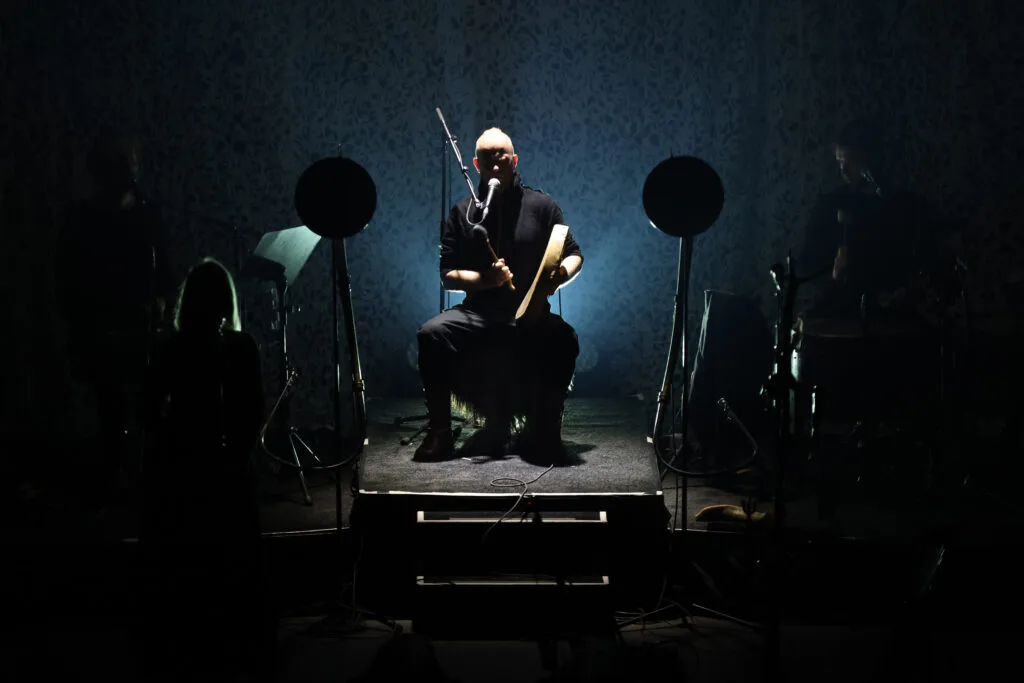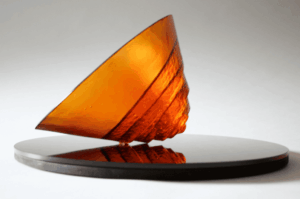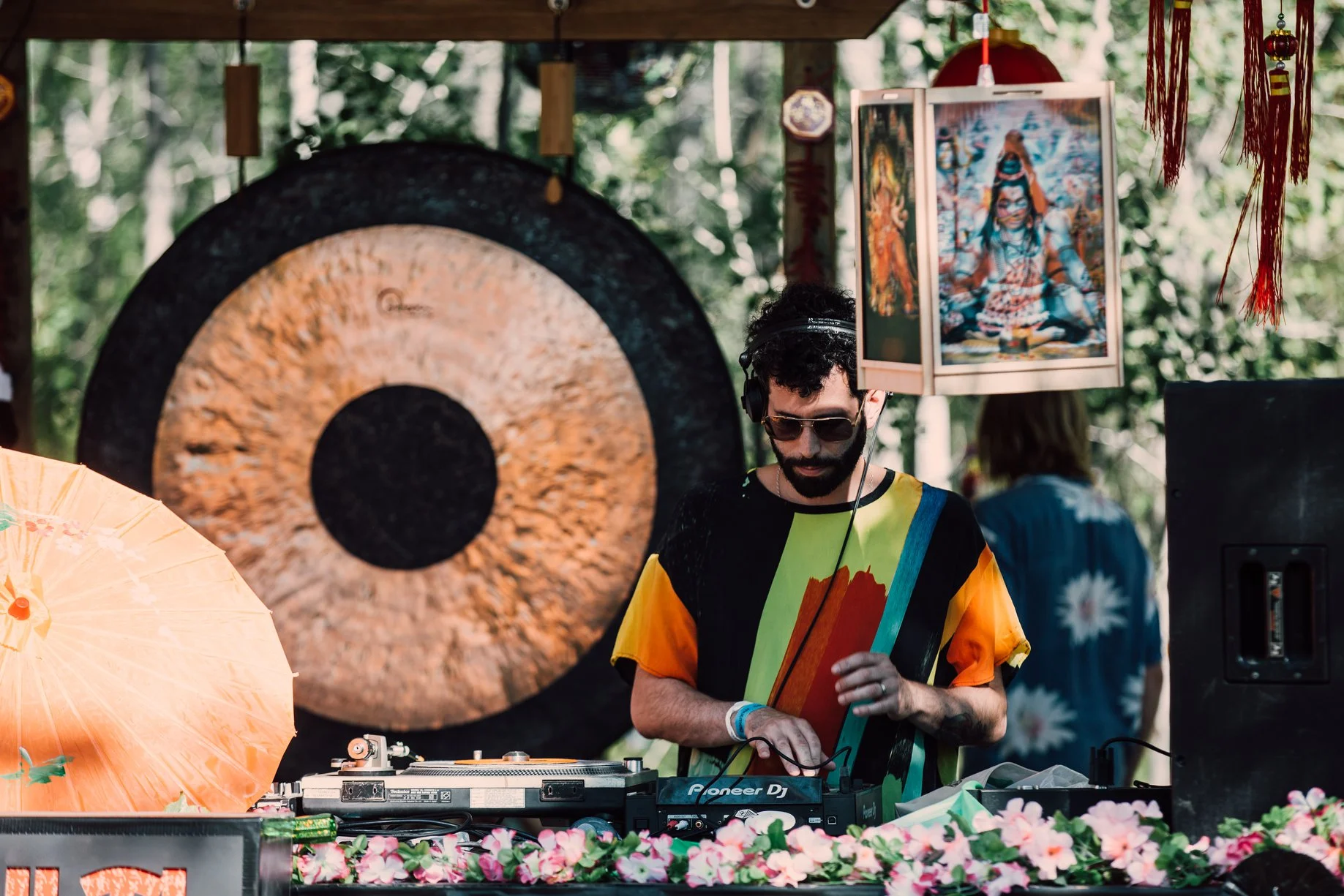On Tuesday October 18th our spirits ascended to the heavens, guided to Valhalla by the mesmerizing melodies of Wardruna. Their performance was deeply appreciated by an enthusiastic crowd. Many of whom dressed up for the occasion by wearing their finest Viking outfits of leather, fur and war paint makeup!
This was one of the concerts that made me feel proud to be a Montrealer. Where a group of unconventional musicians making strange esoteric music were serenaded by the audience with thunderous applause. We vehemently let them know how much their performance moved us!
During the encore. the crowd erupted at such volume that several attempts by the bandleader to speak to us were completely ignored. The audience instead began stamping their feet and drumming on tables and chairs. Collectively letting loose the energy the music had created in us. It reminded me of Saku Koivu’s return to the ice after beating cancer when the arena announcer kept trying to get the crowd to stop cheering so they could sing the national anthem. But every time he tried the speak the audience roared ten times louder. You could tell the band was deeply appreciative of this outpouring of emotion.
So who is this mysterious band that had such a profound effect on us? Founded in 2003 in Norway, Wardruna create a unique blend of neo-pagan folk music based on Norse traditions. Their songs are based on cultural artifacts such as Norse runes, epic poems that recount the deeds of infamous Norse heroes, and on proverbs attributed to Odin in their sacred texts.
The band rose to great prominence due to their involvement in composing the musical score for season two of the hit tv series VIKINGS. Which led to their album Runaljod – Ragnarok reaching #1 on Billboard’s World Music charts. The bandleader Einar Selvik even appeared in the show as a skald, performing Ragnar’s death song in season 4.
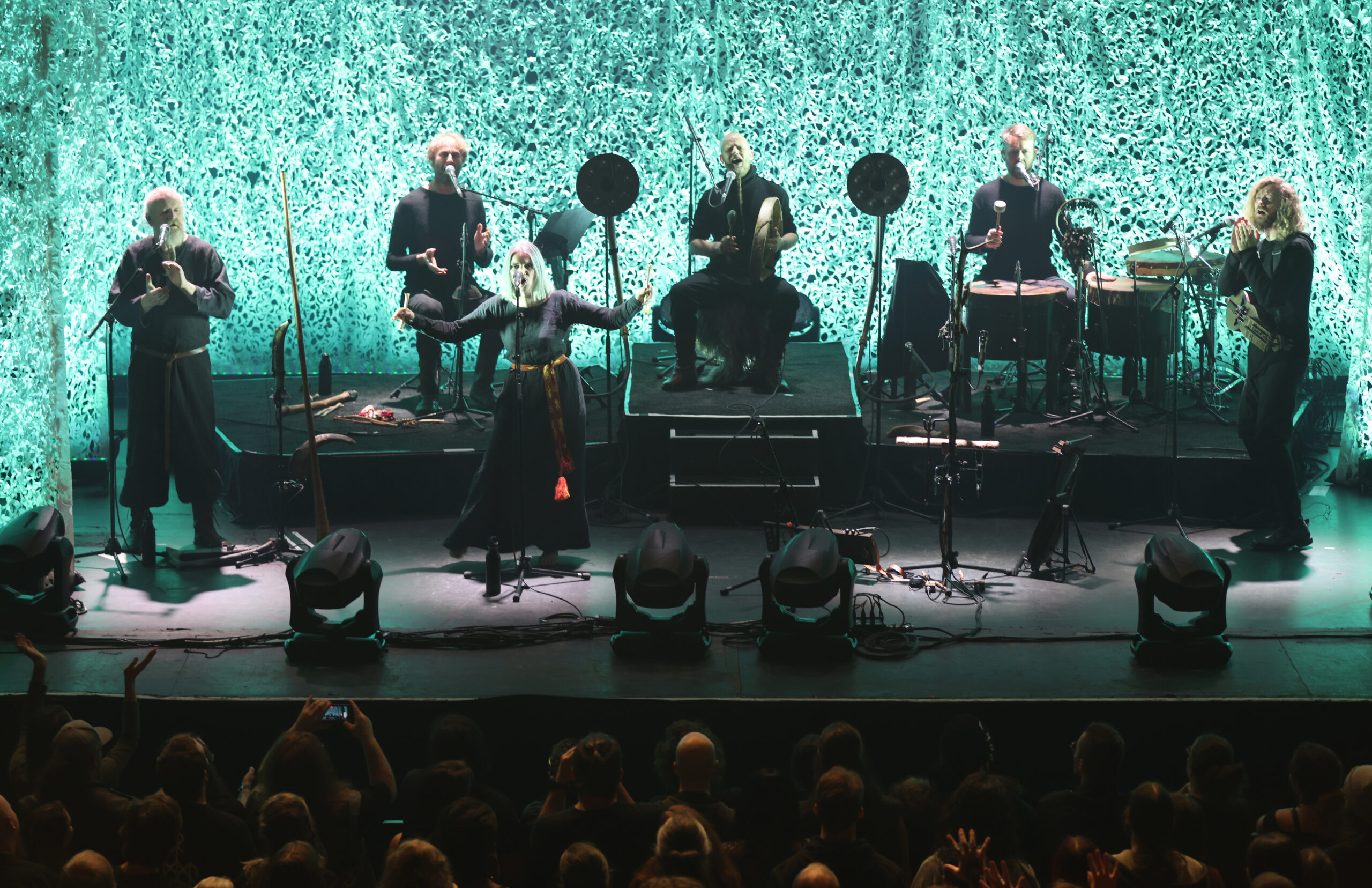
Photo by Paul Van Den Boom
It is inevitable that they will draw comparisons to Heilung but in truth they are very different. Heilung’s music is heavily based on percussion, an orchestra of heavy bass drum beats that pummel your senses. The drones are created by throat singing which adds an eerie otherworldly dimension. They only use primitive instruments that existed in the Dark Ages in Scandinavia, which results in a much rougher sound. The three vocalists share the spotlight throughout every song, taking turns leading and harmonizing. Their vocal styles are in sharp contrast with one another, a blend of throat singing, guttural chants and beautiful ethereal melodies that soar over top. They rely on a lot of call / response dynamics. The music is full of changing dynamics, ebb and flow.
Heilung takes you on a deep primeval journey that consists of both light and dark. Their music is very challenging and not for the faint of heart. They build instruments out of human bones. Their performances are shamanistic rituals, not concerts. It a wild bacchanalia where time has no meaning. Where we howl in a scared grove making sacrifices to the gods under a blood moon.
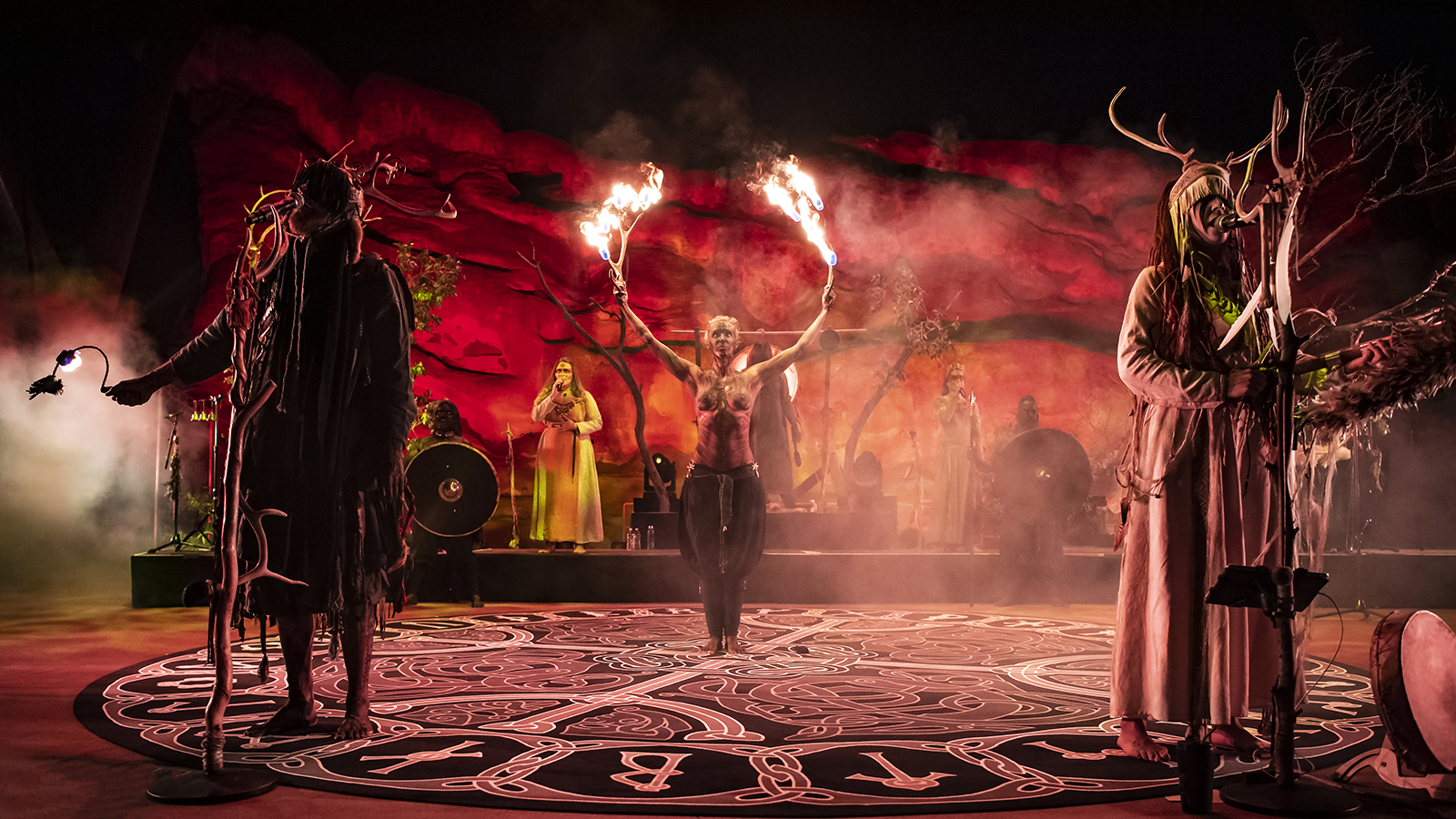
Heilung performing at Red Rocks. Photo by Maurice Nunez
Wardruna also creates evocative ceremonial neo-pagan music inspired from the Viking Age. As opposed to wild pagan rituals, their music feels like a requiem for fallen warriors, sung with deep respect after the war is over. Their costumes are more plain, almost austere. They use more modern instruments from the Medieval Ages. The addition of Medieval stringed instruments allows for more intricate melodies and a softer tonality. They use fewer percussion instruments so it does not have that Pow Wow intensity of an drum circle orchestra.
Their songs are very controlled and structured as opposed to the wild anarchic chaos of their contemporaries. The tempo tends to be slow and steady and they perform with great reverence and gravitas. Their songs have a solemn aspect to them but yet they avoid feeling grim or melancholy. The overall result is much more melodious, uplifting and acessible.
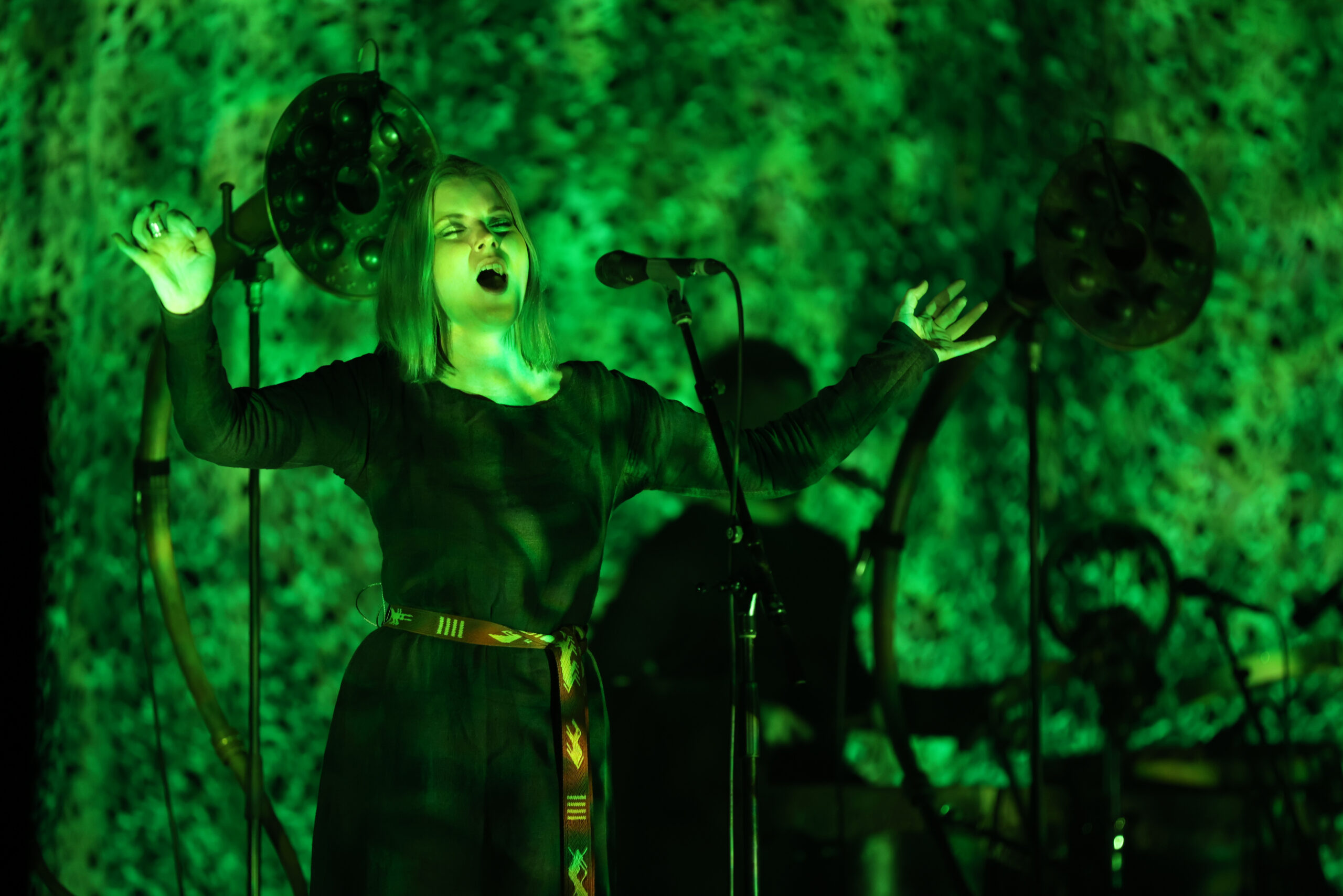
Lindy Fay Hellawith. Photo by Paul Van Den Boom
During the concert most of their songs were led by the singing of Einar, complemented by a female vocalist named Lindy Fay Hellawith. Harmonies were provided by the other four band members. The intensity of Einar’s singing is powerful and operatic. The songs would reach a climax where each instrument and the six voices were acting as unified harmonious layers. Leaving the audience completely entranced.
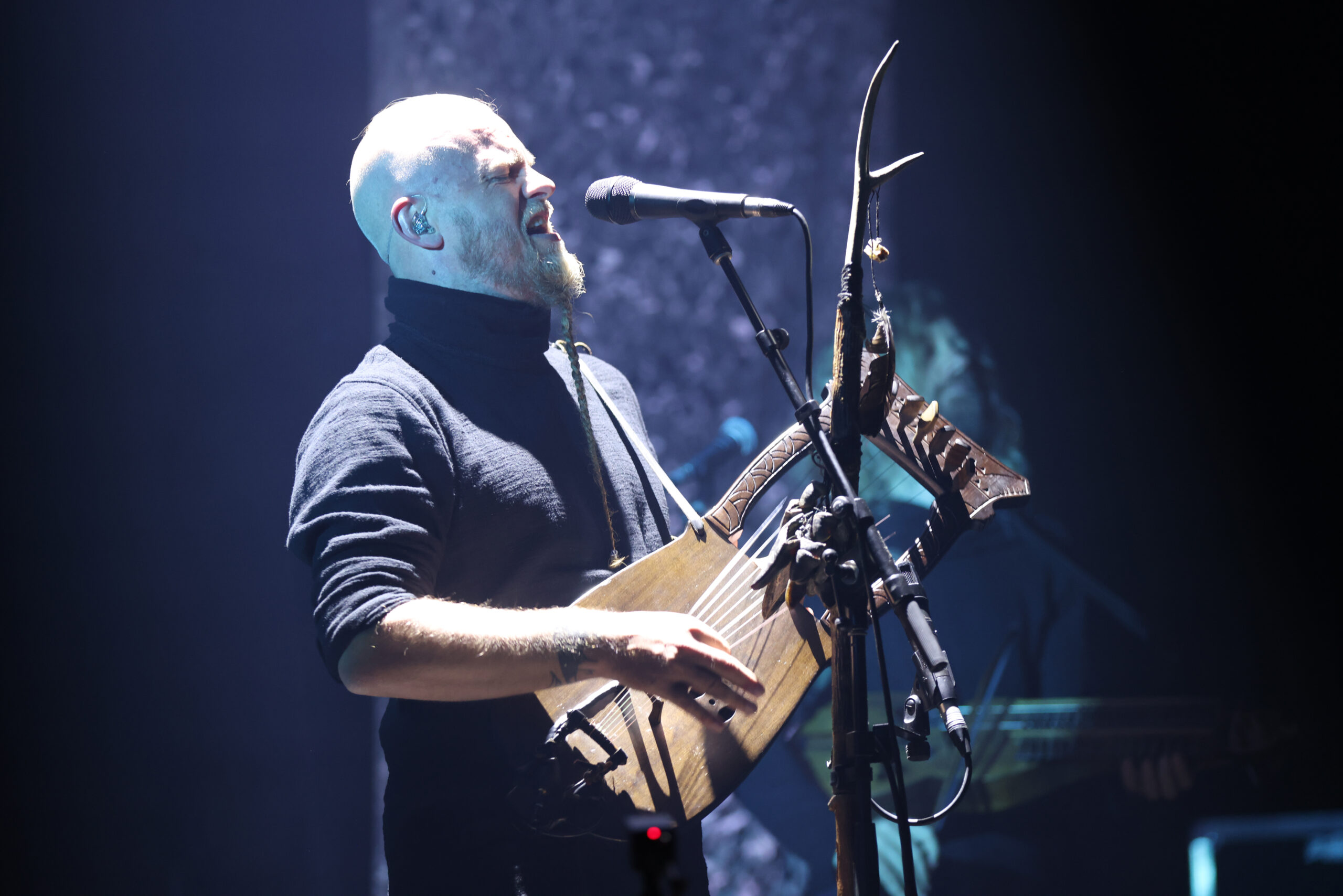
Einar Selvik playing the jouhikko. Photo by Paul Van Den Boom
In terms of the instrumentation, Einar used several varieties of lyre such as the Finnish one known as a jouhikko. The earliest depiction of the jouhikko is from a carving in Trondheim Cathedral that dates from the 13th century. He also played various percussion instruments like a wood block and a hand held drum similiar to an Irish bodhran.
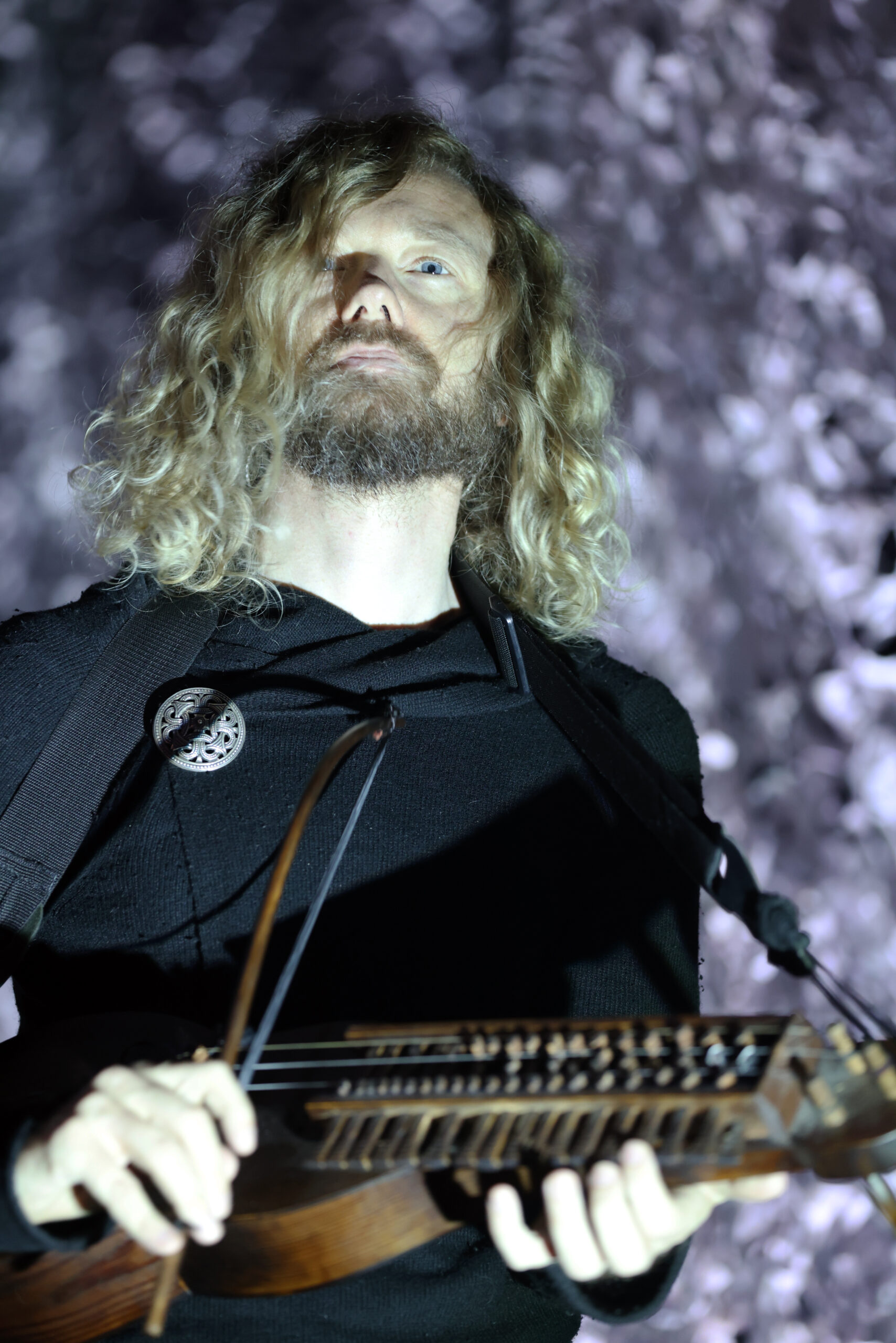
John Stenersen playing the moraharpa. Photo by Paul Van Den Boom
John Stenersen played the main melody instrument throughout the concert that is called a moraharpa. It is the ancestor of the nyckelharpa. Essentially it a keyed fiddle similar to a hurdy gurdy. It emits a variety of sounds, from drones to melodies very similar to a violin. The earliest known version of this instrument dates from 1525. He also played a jaw harp on certain songs, which added that unusual twangy drone.
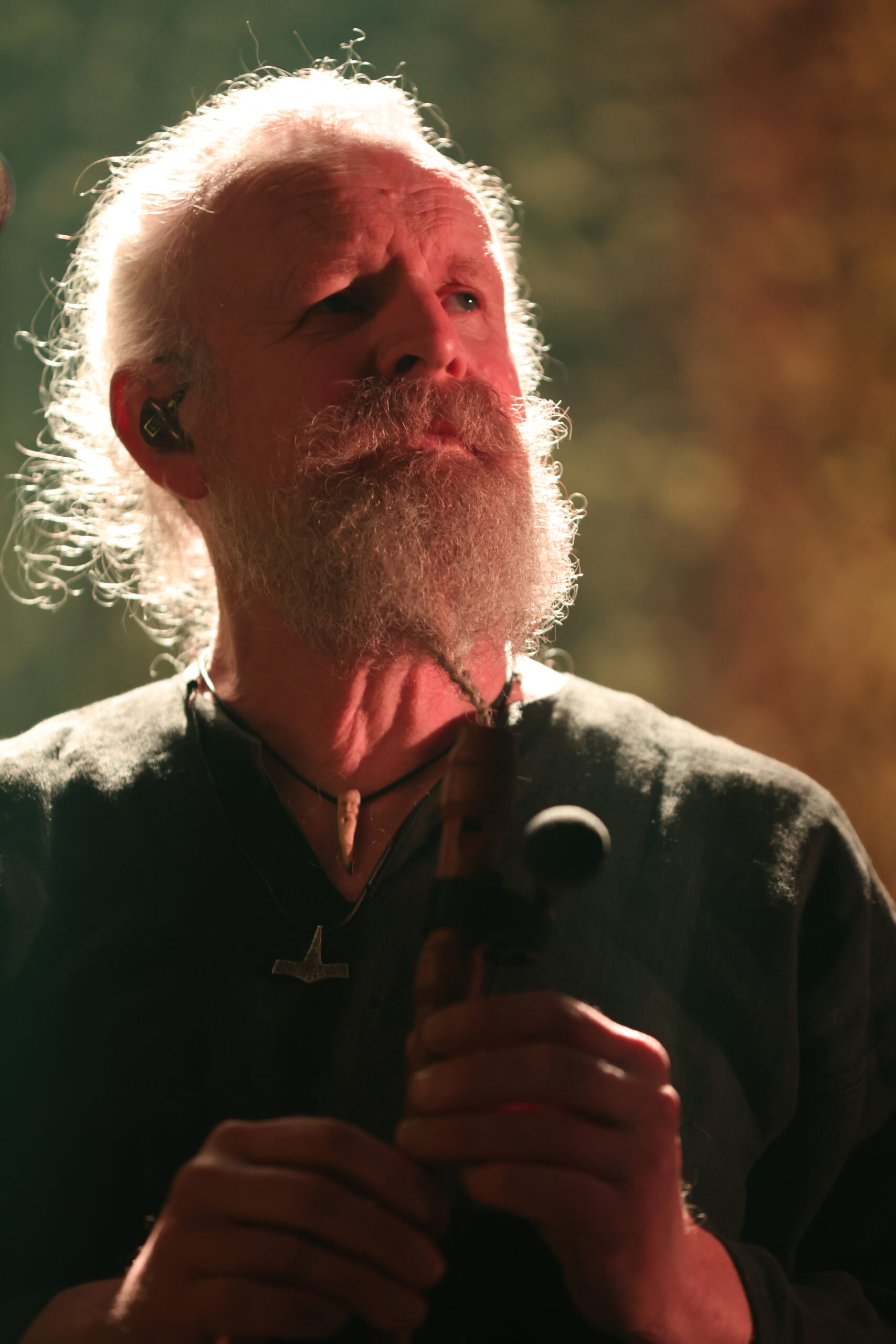
Eilif Gundersen, Photo by Paul Van Den Boom
The rhythm section consisted of HC Dalgaard on percussion, drums & back up vocals and Arne Sandvoll as a jack of all trades on a variety of instruments. Eilif Gundersen played an array of wind instruments. From simple melodious flutes with a clear pitch to the more unusual sounding bukkehorn. Made from the a ram’s horn, it has a strange warbled pitch that reminds me of a shenai (the flute used by snake charmers in India).
But the most impressive were these massive ceremonial horns known as lur. The lur is a curved horn made of wood and bronze. The curved shape was developed to make it easier to carry by soldiers when armies were on the march. There were played as a pair, providing an added dimension to the band’s sound.
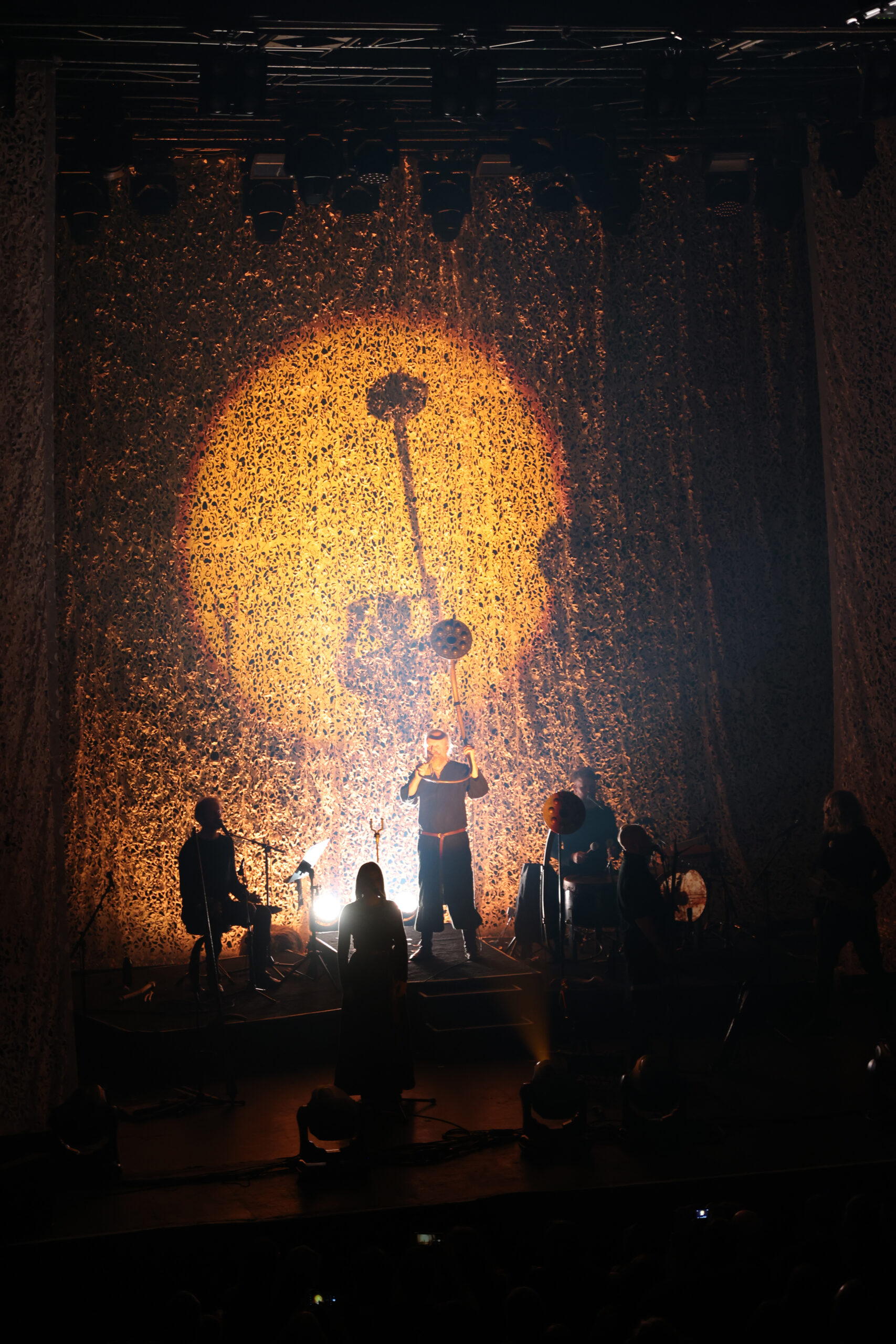
Lighting & video effects to showcase the Lur. Photo by Paul Van Den Boom
The stage design was complemented by video projections on a series of textured white screens. They projected Viking runes, nature landscapes, sacred animals. At times the lights would focus on a specific band member who was leading the song and cast a massive shadow on the main screen behind the band. Creating an effect of a shaman reciting a saga by the fire, his smoky shadow looming dramatically on a cave wall. At key moments in the songs the creative lighting design would flash from the sides of the stage, illuminating the band in unexpected ways.
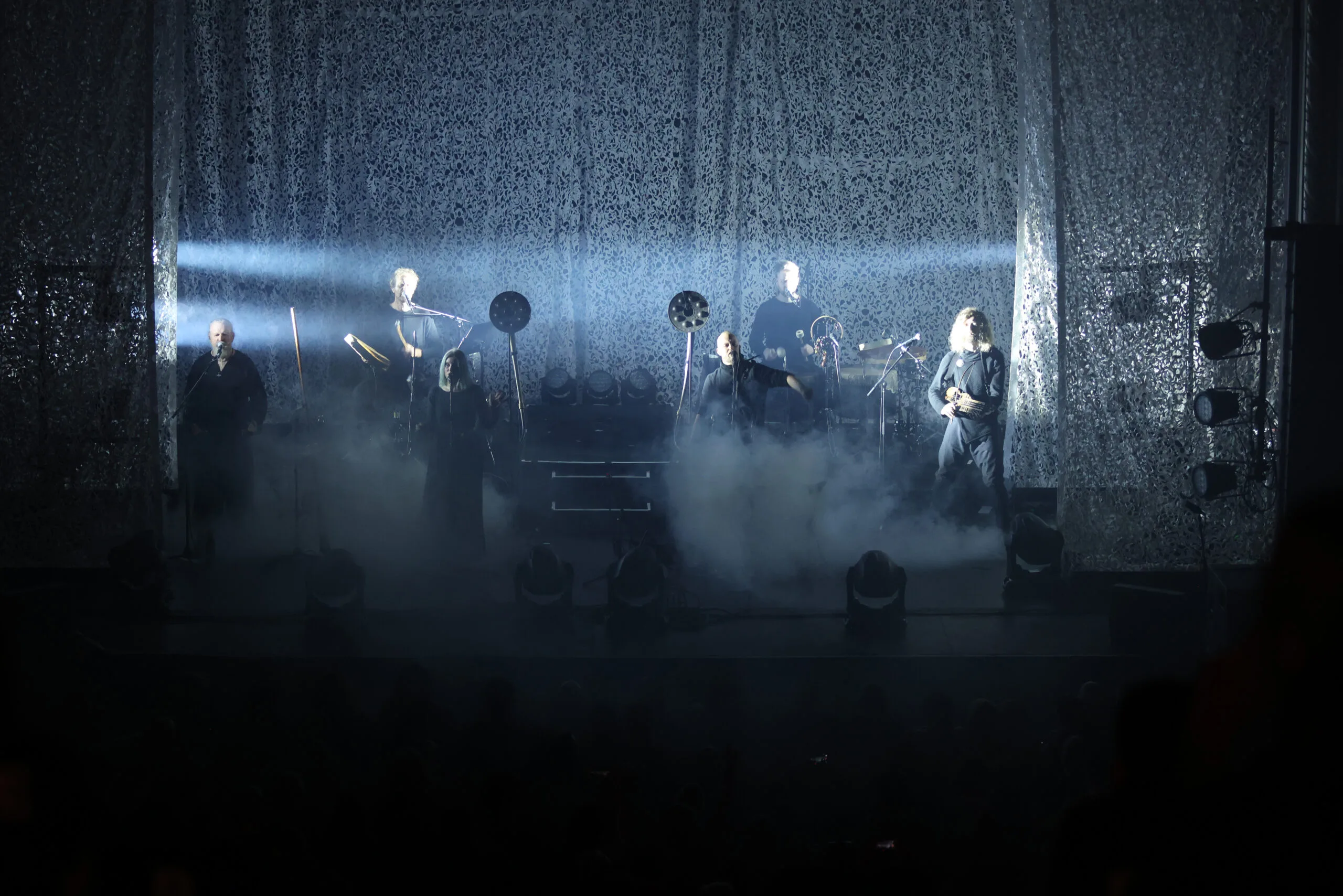
Photo by Paul Van Den Boom
In the encore when Einar finally managed to quiet down the crowd, he delivered a heartfelt speech. He explained the band’s guiding philosophy is to treat the past with reverence in order to create something new. They are not pretending to be Vikings and definitely not in agreement that their music be appropriated by White Supremacists. Their message is that all cultures have something to teach us. Honoring our ancestors is not a competitive sport where we must defeat and eliminate other cultures.
He spoke about how in the modern world we have lost the tradition of singing together as a community. To mark momentous occasions through song. In the old days we had songs for weaving, song for planting, songs for reaping, songs for cooking, songs for brewing beer.
We had songs to honor the dead, to help guide their spirits from Earth to Valhalla. He encouraged us to create new sacred songs together. Which led to a stirring performance of the requiem song Fehu, which for me was the highlight of the concert. There is just something special about this song that gets me right in the feels.
The band took their bows and again the crowd erupted into pandemonium that would not be easily silenced. When order was restored, the band left except for Einar. He told us how nice it was to be back in Montreal, that they had spent time here working on music for the Ubisoft video game Assassin’s Creed Valhalla.
He then spoke about his experiences on the tv show Vikings, how honored he was to perform on camera the epic poem Krákumál. Which tells the story of Ragnar Lodbrok’s final moments. He was executed in England by being thrown into a snake pit. He joked about how the lyrics in the old Viking sagas were infinitely more gory than the most extreme contemporary Black Metal. For the final encore he performed this moving tribute to Ragnar, a requiem to guide him across the Rainbow Bridge…
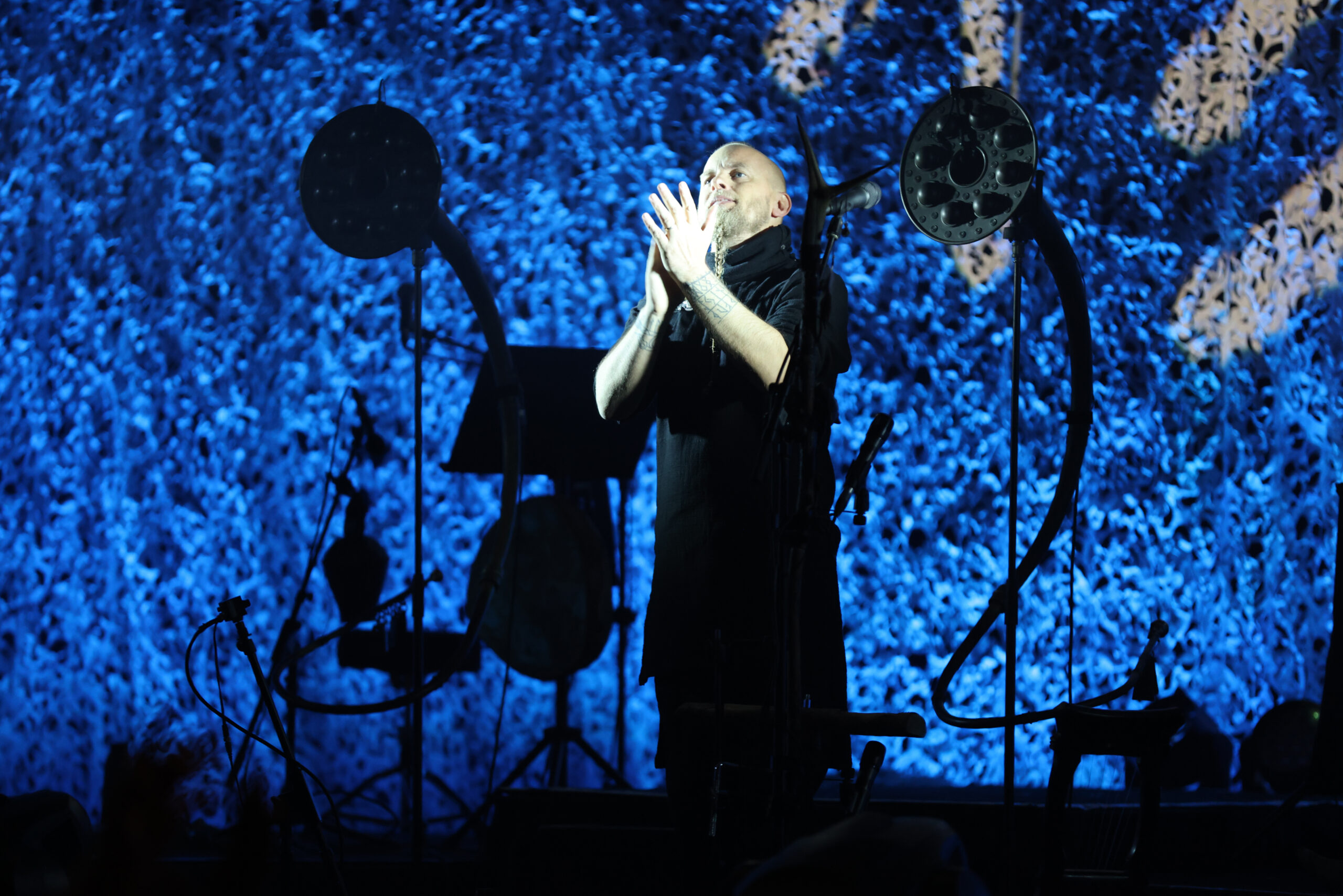
Einar serenading us with the final moments of Ragnar Lodbrok’s life. Photo by Paul Van Den Boom
If you would like to learn about Heilung, check out our review of their performance in Montreal in 2020 here.


